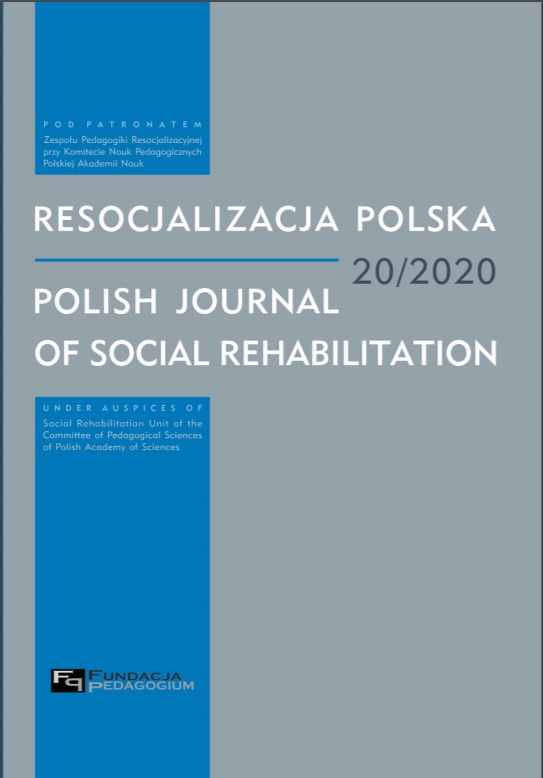The importance of resources in the personal adaptation of people taking OTC drugs
The importance of resources in the personal adaptation of people taking OTC drugs
Author(s): Robert Modrzyński, Aleksandra RadońSubject(s): Substance abuse and addiction, Health and medicine and law
Published by: Fundacja Pedagogium
Keywords: over-the-counter drugs; OTC; personal adaptation; Resources; Conservation of Resources Theory
Summary/Abstract: Over-the-counter medication has become a common phenomenon in Poland. Every fifth person uses them contrary to the instructions, often exceeding the permissible doses. This problem concerns various social and professional groups. However, it is not alwaysconnected with addiction and can lead to losses in many different areas. Undoubtedly,the search for psychological connections that determine the need to reach for medicationswithout a medical recommendation becomes a priority. The Theory of Conservation of Resources (COR) by Steven E. Hobfoll can provide an alternativeapproach to understanding the phenomenon of over-the-counter drugs. It is based onthe assumption that human activity is focused on gaining, maintaining and protecting resources.Their gain or loss is fundamental to the quality of life and is a source of motivationfor specific behavior. From the perspective of the COR theory, the loss of resources or theimpossibility of gaining them may explain the high percentage of people taking medicationswithout medical recommendation.The main aim of the paper is to answer the question on what are the functions of resourcedistribution in personal adaptation. Moreover, it is equally important to determine what arethe dependencies between psychosocial factors and personal adaptation in people takingOTC drugs.Material and methods: A questionnaire survey of 300 people taking medications withoutmedical recommendation was used. The tools used were S.E. Hobfoll’s Conservation ofResources-Evaluation (COR-E) questionnaire, the Rotter Incomplete Sentences Blank (RISB) test, the Beck Depression Inventory (BDI) and the Multidimensional Scale of Perceived SocialSupport (MSPSS) by G. Zimet.Results: The structural equation modeling indicated a causal relationship between gain inresources and personal adaptation (p = 0.001) as well as loss of resources and personaladaptation (p = 0.003). The increasing pool of resources and lesser experience of their lossare predictors of adaptation. The hypothesis that the process of positive adaptation in peopletaking OTC drugs depends on the distribution of resources has been confirmed.Conclusions: People using over-the-counter drugs in a situation of experiencing a loss of resourcesshow symptoms of personal maladjustment. The ability to properly adapt to changingliving conditions and deal with problems depends primarily on the ability to gain resources.Over-the-counter medication has become a common phenomenon in Poland. Every fifth person uses them contrary to the instructions, often exceeding the permissible doses. This problem concerns various social and professional groups. However, it is not always connected with addiction and can lead to losses in many different areas. Undoubtedly,the search for psychological connections that determine the need to reach for medications without a medical recommendation becomes a priority. The Theory of Conservation of Resources (COR) by Steven E. Hobfoll can provide an alternative approach to understanding the phenomenon of over-the-counter drugs. It is based on the assumption that human activity is focused on gaining, maintaining and protecting resources. Their gain or loss is fundamental to the quality of life and is a source of motivation for specific behavior. From the perspective of the COR theory, the loss of resources or the impossibility of gaining them may explain the high percentage of people taking medications without medical recommendation. The main aim of the paper is to answer the question on what are the functions of resource distribution in personal adaptation. Moreover, it is equally important to determine what are the dependencies between psychosocial factors and personal adaptation in people taking OTC drugs. Material and methods: A questionnaire survey of 300 people taking medications without medical recommendation was used. The tools used were S.E. Hobfoll’s Conservation ofResources-Evaluation (COR-E) questionnaire, the Rotter Incomplete Sentences Blank (RISB) test, the Beck Depression Inventory (BDI) and the Multidimensional Scale of Perceived SocialSupport (MSPSS) by G. Zimet.Results: The structural equation modeling indicated a causal relationship between gain in resources and personal adaptation (p = 0.001) as well as loss of resources and personaladaptation (p = 0.003). The increasing pool of resources and lesser experience of their loss are predictors of adaptation. The hypothesis that the process of positive adaptation in people taking OTC drugs depends on the distribution of resources has been confirmed.Conclusions: People using over-the-counter drugs in a situation of experiencing a loss of resources show symptoms of personal maladjustment. The ability to properly adapt to changing living conditions and deal with problems depends primarily on the ability to gain resources.
Journal: Resocjalizacja Polska
- Issue Year: 20/2020
- Issue No: 1
- Page Range: 321-335
- Page Count: 15
- Language: English

